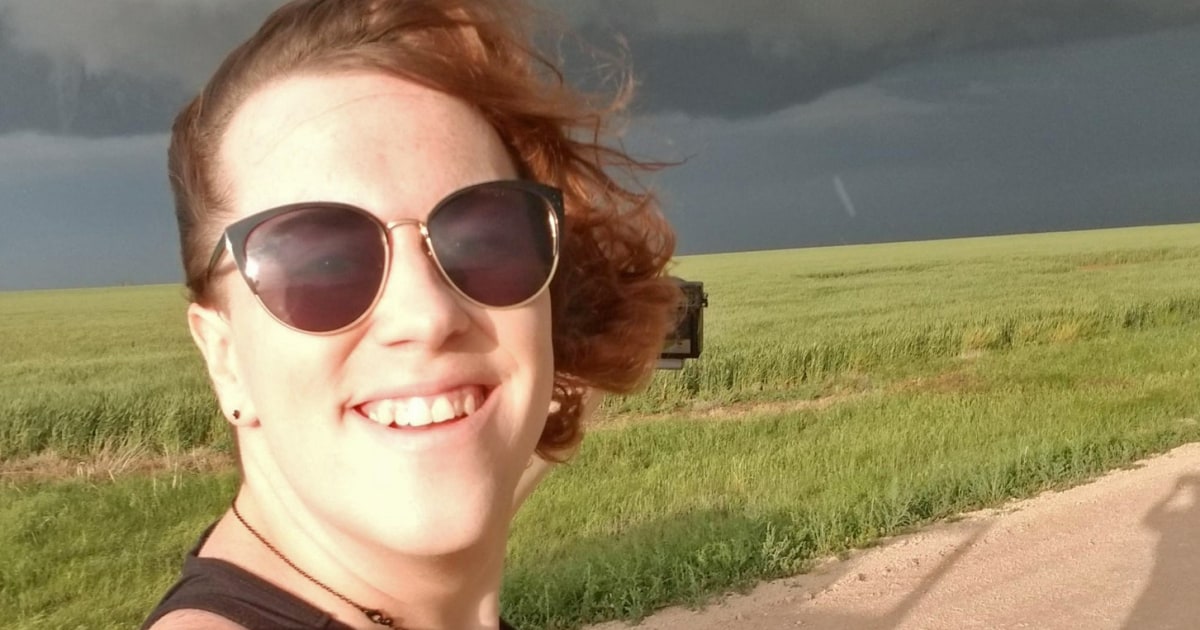
As the eye of Hurricane Laura passed over Lake Charles, Louisiana, in the early morning of Aug. 27, 2020, storm chaser Chimera Comstock took advantage of the brief calm to post a photo of herself on Twitter — rain-soaked and grinning as she held up a blue, pink and white transgender Pride flag in a hotel parking lot.
“Since I have all your attention right now in the #eye cat 4 of #HurricaneLaura I thought I would take this moment to #ComeOut as #trans to the world,” Comstock wrote in the tweet, which she has given NBC News permission to embed, even though it includes her former name. “I started HRT on Feb 17th 2020. Anyways back to surviving this #storm. See you all on the otherside! #transrightsarehumanrights!”
For Comstock, who grew up in Oklahoma, coming out felt like throwing off a mask she had worn since childhood.
“I wasn’t happy no matter where I was, just because it wasn’t me that was ever having the success,” Comstock said, noting that she is part of the “zero meter club,” the unofficial name given to a small group of seasoned storm chasers who have gotten as close as possible to a tornado without dying. “It wasn’t me that people were seeing or knew or became friends with — it was a character I played to hide the fact that I was trans.”
Rumors about her transition were already swirling within the storm chaser community, a small group of mostly men from conservative parts of the country, Comstock said. She also noted that there are not many openly gay storm chasers — and even fewer who are openly transgender.
“I decided to just go ahead and grab the bull by the horns and try to get it out there,” Comstock, 34, said of coming out. But she said she also wanted to create more visibility for the trans community by letting the world know “we exist, and we’re not that different from the rest of y’all.”
Comstock, who lives in Norman, home to the University of Oklahoma, began filming storms with a camcorder when she was a kid near her childhood home. She filmed her first tornado in 2006, and since then, she has chased 125 tornados and 17 hurricanes and tropical storms across the U.S. She said she has filmed major weather events that have been featured on national media, including on The Weather Channel, Discovery Channel’s “Storm Chasers” program and nearly every broadcast network. She has driven into five tornadoes, she said, including one that hit Nebraska in 2014 with 110 mph winds.
“It brought high-tension power lines down on top of us,” she said, “as well as blew a house apart on us.”
Comstock said she is likely the only out transgender person to experience both a Category 5 hurricane and an EF 5 tornado — the most powerful of their respective kind. She pursued the EF 5 twister that tore through Joplin, Missouri, in 2011, killing more than 150 people. The worst storm she survived, however, was Hurricane Michael, a Category 5 that devastated Florida in 2018. As the storm churned into the Florida Panhandle on Oct. 10, Comstock and fellow storm chasers took refuge at Tyndall Air Force Base after the wind shredded their car to pieces. Then, she said, the hurricane ripped the roof off from over their heads while they were on the base.
“We very narrowly escaped that event with our lives,” Comstock said, comparing the storm’s aftermath to that of an atomic bomb.
Now, with well over 100 major storms under her belt, Comstock is dealing with the aftermath of coming out as transgender. Since announcing her transition, she lost her main source of income (a job selling equipment for the trucking industry), she said, and she is working in retail to make ends meet while she pursues a degree in information technology. She is far from alone: According to the 2015 U.S. Transgender Survey, more than 1 in 6 trans respondents who had ever been employed reported losing a job because of their gender identity or expression.
Making matters worse, she said, many of her fellow storm chasers have distanced themselves from her or stopped working with her entirely. “I lost most everybody I worked with because of it,” she said.
As a result, she chases fewer storms now and is often alone when she does. On her last chase — Hurricane Ida, a Category 4 that ransacked Louisiana over the summer — the tires were ripped off her car by the wind. Normally, she would call fellow storm chasers for help and someone would come, but none were willing to help her after Ida, leaving her stranded for a day.
“It’s been extremely isolating,” Comstock said.
Despite the risks, Comstock has no plans to give up storm chasing, which she sees as an important way to educate people. When people see storms on TV, she said, they are much more likely to flee or take shelter. Capturing the aftermath of a tornado or hurricane, she added, often brings much-needed support to the communities they leave in ruins.
“When you are able to see what is happening versus just hearing it described, or just reading a description, that makes a much more profound impact,” she said.
As climate change brings more destructive storms, like the massive tornado that cut a 200-mile path of wreckage through Kentucky earlier this month, filming them and their destruction up close, she said, lets people see the growing dangers of a warming climate.
“We’re going to keep allowing the conditions for events like this to happen more frequently than had been previously,” Comstock explained. “And it really highlights that we need to focus on educating people about these storms, that traditionally may not have needed that education, so that they know what’s out there.”
But she acknowledged another reason she continues to chase: the adrenaline.
“You’ll never have an experience where you’ve narrowly come through something that you shouldn’t and realize that you made it out on the other end,” she said. “What a rush that is.”
Follow NBC Out on Twitter, Facebook & Instagram
Source: | This article originally belongs to Nbcnews.com










